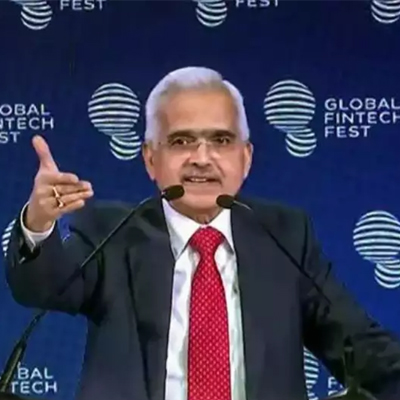Digital Transformation Maestro: Revolutionizing Aviation and the Role of the CIO

Mr. Vinod Bhat, CIO & CEC at Vistara - TATA SIA Airlines Ltd.
The Aviation Industry at a Crossroads
In the digital age, the aviation sector confronts unique challenges and opportunities. The COVID-19 pandemic has undoubtedly hastened the shift towards digital solutions. This shift addresses evolving consumer needs and operational demands, ensuring both competitiveness and profitability. This transformation calls for robust and strategic leadership and highlights the necessity of crafting a prudent vision to navigate the highly dynamic future successfully.
The Critical Role of CIOs
Amidst this digital transformation that the aviation industry is witnessing, seasoned Chief Information Officers (CIOs) are orchestrating a revolution — they are piloting through the digital landscape with insider wisdom. These visionaries are harnessing the power of cutting-edge technologies, including artificial intelligence (AI), the Internet of Things (IoT), big data analytics, and cloud computing, to integrate digital transformation across all facets of aviation operations seamlessly. This strategic orchestration helps enhance efficiency and innovation while propelling the sector toward a future where technology and human expertise converge to redefine the boundaries of aviation.
Enhancing Operational Efficiency
A key goal of digital transformation in aviation is to elevate operational efficiency. CIOs need to collaborate with stakeholders from various departments to refine processes, maximise resource utilisation, and reduce downtime. For example, leveraging AI-driven predictive maintenance systems allows for anticipating equipment failures before they happen. This subsequently facilitates preemptive maintenance measures that curtail expensive interruptions. This collaborative approach optimises operations and ensures a smoother, more reliable service framework.
Elevating Passenger Experience
In the contemporary interconnected world, passengers demand a frictionless journey from when they book to when they collect their luggage and leave the airport. CIOs utilise digital innovations to tailor services, deliver instant updates, and streamline the travel process. Deploying mobile applications, self-service kiosks, and biometric verification technologies significantly elevates convenience and satisfaction for travellers. This strategic enhancement of the customer experience helps cultivate loyalty. Moreover, it helps craft experiences that help airlines stand out in a fiercely competitive market.
Ensuring Safety and Compliance
Safety is the cornerstone of aviation, where CIOs play a crucial role in designing regulatory compliance and pioneering safety practices. Their expertise in rolling out robust cybersecurity measures and harnessing the power of data for smarter decisions is critical in minimising risks and upholding unmatched safety standards. In this relentless pursuit of safety, technology emerges as a vital ally – it ensures the well-being of passengers and crew while bolstering the industry's commitment to reliability and trust.
Driving Innovation and Sustainability
Digital transformation is the key to unlocking innovation and sustainability in the aviation sector. CIOs are the introducers of efforts that explore emerging technologies that pave the way for paperless operations,as Technologies such as e-tech logbook solution, RFID AeroCheck that digitally tracks the presence and expiration of emergency equipment onboard an aircraft, a digital crew rostering system or robotic cleaning of aircraft help reduce the carbon footprint while also ensuring efficient utilisation of resources. Aviation companies are demonstrating a commitment to a sustainable future in air travel through several such initiatives,.
"In the digital orchestra of aviation, the CIO is the conductor, leading the melody of a prosperous future in the skies."
The Strategic Imperative for CIOs
The aviation industry is advancing in the digital era, and the onus is on CIOs to embrace a forward-thinking approach to spearhead meaningful transformation. They must synchronize technology-driven initiatives with overarching business goals, nurture an environment ripe for innovation, and encourage teamwork. Furthermore, staying informed about the latest technological developments and forecasting upcoming trends is crucial for CIOs aiming to keep their companies ahead. This strategic vision drives progress and ensures that aviation remains on a continuously improving and adapting.
A Conversation with a Change Maker
(An exclusive interview of Mr. Vinod Bhat, CIO and Chief Ethics Counsellor, Vistara)
Mr. Vinod Bhat, with a vision as vast as the skies, pilots through the digital landscape with an insider's wisdom and the expertise of a seasoned CIO. This candid interview delves into his illustrious career achievements and forward-thinking insights.
Your leadership style has been pivotal in navigating complex challenges. Can you share your philosophy?
My leadership philosophy revolves around leading by example and promoting teamwork. It's about adapting to industry changes while striving for excellence. I empower my team by offering them the tools and freedom they need to innovate and excel. The aviation sector's dynamic nature requires evolving strategies, agility and constant innovations across various areas of operations. At Vistara, our culture credo is built on four key pillars - being Open & Transparent, Performance-driven, Innovative & Agile and Customer-centric. These values encourage all to deliver new standards of service excellence and drive success at Vistara.
Managing global teams presents unique challenges. How do you address these?
Managing staff from across geographies can be challenging. We address this through targeted training and by fostering an inclusive environment that respects and values diversity. Effective communication and leveraging technology also play a crucial role in bridging gaps.
The aviation industry is undergoing rapid digital transformation. What initiatives have you led in this space?
We've embraced digital innovation to enhance operational efficiency and sustainability. Adopting RFIDAeroCheck from Aerospace Software Development (ASD) to effectively track the presence and expiration of emergency equipment across Vistara’s fleet of Airbus and Boeing aircraft, embracing SITA's eWAS and SITA OptiClimb solutions to optimize flight paths while avoiding weather disruptions and reducing fuel consumption and introducing a fully automated crew rostering solution by Jeppesen, a Boeing Company, are some of the initiatives that I would like to highlight.
Ethical considerations are paramount in decision-making. How do you navigate this?
Vistara is governed and guided by the Tata Code of Conduct (Code), which serves as the ethical roadmap for all employees across the Tata group. Our reputation and success as a business entity has been defined by the powerful commitment and adherence to the core values and principles expressed in this Code by all our employees, directors and partners. We remain committed to upholding the highest ethical standards while conducting business.
Looking ahead, what trends do you see shaping the future of aviation?
The future is exhilarating. The aviation industry will see significant changes driven by technology. Artificial Intelligence (AI), Machine Learning (ML), and Biometric-based touchless solutions will improve operations and transform customer experiences. Immersive technologies like AR, VR, XR, the Metaverse, and Digital Twins will transform training and maintenance. Backed by 5G and potentially 6G networks, Edge computing will enable real-time data processing. Enhanced cybersecurity with Zero Trust frameworks and technologies like RFID, IoT, and blockchain will boost efficiency and security. These changes reflect the industry's focus on innovation for safety, efficiency, and passenger satisfaction.
Lastly, what achievements are you most proud of?
I'm proud of our team's resilience and adaptability, especially in facing challenges. Leading initiatives that have a lasting impact on our operations and setting the stage for future innovations are highlights of my career.
A Commitment to Excellence
Peering into the future, visionary leaders in aviation are pinpointing AI, ML, biometric solutions, immersive technologies, and advanced networks as pivotal trends propelling the industry forward. Their careers, marked by numerous accolades, speak volumes of their influential impact. Looking ahead, these leaders foresee a more integrated blend of technology and business strategy, setting the stage for an era of customer-focused innovation.
The Journey into Industry
Mr Vinod Bhat is a distinguished figure in the technology and business landscape, with a prosperous career spanning 31 years. Currently serving as the Chief Information Officer at Vistara Airlines, he integrates the roles of CISO, CTO, and CDO – showcasing a multifaceted leadership style. His work, marked by innovative digital solutions, has significantly enhanced aviation, doubling a key vertical's revenue from $100M to over $200M in just two years. With an expansive global footprint, Mr Bhat's leadership extends across various continents, from the USA to APAC, underlining his adeptness in managing diverse teams and cultures. His strategic vision has led to winning multi-million dollar deals, amassing a total contract value exceeding $1B. Vinod excels in nurturing high-level relationships, driving operational excellence, and fostering a culture of achievement and ethical performance. As a motivational leader and author, his influence resonates in and beyond the industry, embodying a commitment to excellence.
.jpg)
.jpg)
.jpg)
.jpg)



